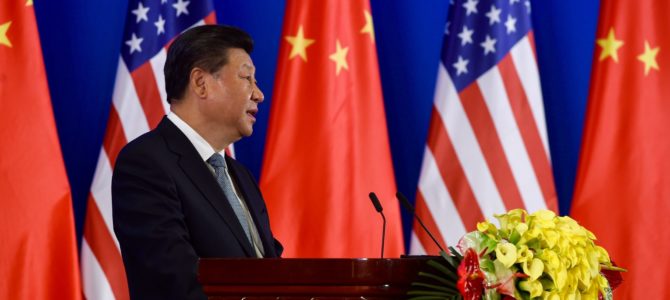
A section of foreign policy realists has written a lot about why a U.S. rivalry with China is inevitable. In the liberal idealist heydays of the 1990s, when the Clinton administration was paving the way for “normalizing” China through the World Trade Organization, the conventional wisdom was that once the U.S. market was open to China, everything would fall into place, and the power of the market and capitalism would lead to the spread of human rights, democracy, and rule of law.
This liberal idealism, which is enormously common and often comes up in strategic talks, is needless to mention naïve and utopian. Nevertheless, it was the conventional wisdom that China, due to the burden of its global responsibilities, would become a responsible stakeholder and global citizen through greater market access.
Learning from Historical Rising Powers
A few conservatives and a section of the foreign policy realists warned that would never happen because the history of great powers suggests otherwise. John Mearsheimer, in his seminal work “The Tragedy of Great Power Politics,” outlined why China, like every other rising great power in history, would try to create its own sphere of influence and try to push the United States out of Asia-Pacific, which the United States, as a maritime power, can never afford to allow.
Naturally, the chance of a rivalry remains. In his book Graham Allison talked about the Thucydides Trap, where he charted 16 historical instances in which a rising power tried to push an established power, resulting in a rivalry, or worse, a conflict. But the best and most underrated work in the last few years was an essay by Robert Kaplan, who wrote:
The American foreign policy elite does not like to talk about culture since culture cannot be quantified, and in this age of extreme personal sensitivity, what cannot be quantified or substantiated by a footnote is potentially radioactive. … Anyone who travels in China, or even observes it closely, realizes something that the business community intuitively grasps better than the policy community: the reason there is little or no separation between the public and private domains in China is not only because the country is a dictatorship, but because there is a greater cohesion of values and goals among Chinese compared to those among Americans.
Even though China is nominally Marxist, it also has a Confucian cultural backbone, and “within that system, Confucianism still lends a respect for hierarchy and authority among individual Chinese, whereas American culture is increasingly about the dismantling of authority in favor of devotion to the individual,” said Kaplan. “Confucian societies worship old people; Western societies worship young people.”
China Is Indeed a Rising Power Threat
Anyone who has observed the last few days with the NBA fiasco should go back and read Kaplan’s essay and see how prophetic he was. China is one of the greatest rising great power threats the United States now faces, greater than imperial Spain, imperial Germany, Nazi Germany, imperial Japan, and even the Soviet Union.
The reason is simple. America was a rising power when it faced imperial Spain as well as Kaiser’s Germany. America had allies such as the British empire when it was locked in an existential struggle with the Nazis and the Japanese. And America was the only country without any damage to its own mainland. With the biggest economy in the globe, it faced an autarkic Soviet Union, which was more damaged by its own ideological dogma than anything else.
The role is now reversed. Washington is now the tired hegemon, carrying the security burden of the world with a stagnating economy and a lost manufacturing base, with its military spares manufactured in China. More importantly, Washington is beset by the same ideological free-market dogma the Soviets had with autarky, and facing a growing power.
Consider this. If the Soviets were not autarkic and could enjoy the benefits of free trade with the West, do you think America or the West would have enjoyed the technological advantage it had during the 1980s? The answer is no.
American businesses would have outsourced all the jobs to cheap Soviet labor, and the USSR would have simply ripped off the technical knowhow and intellectual property, while maintaining the advantage of the iron core discipline of the Soviet state. This is exactly what China is doing: benefiting from Western trade and hollowing out Western manufacturing, while maintaining a hawk’s devotion to the pursuit of great power and glory.
Why Woke Corporations Are the Real Threat
China is a threat, but far bigger threats are the woke corporatists who would sell their mother for the market. Footballers and female soccer players can take a knee against the American flag, but they’re silent and self-censorious about any atrocity in Hong Kong.
Apple can silently delete the Taiwan flag emoji to appease its overlords in Beijing. Google can refuse to work with the Pentagon, while helping Beijing implement the strongest secretive surveillance state. Hollywood actors can stop working in the Southern states because local abortion laws hurt their feelings, but they have no problem prostituting themselves for the vast Chinese market despite actual concentration camps in Xinjiang. This is the logical extreme of the free-market dogma, which is a dogma because it has forgotten that sometimes the market should be subservient to national interest.
As Epictetus once wrote, “He is a wise man who does not grieve for the things which he has not, but rejoices for those which he has.” The seeds of destruction are often within, and the loss of a way of life is often felt when it is lost. One should keep that wisdom in mind as a former Cold War rival returns to form in the Far East.









